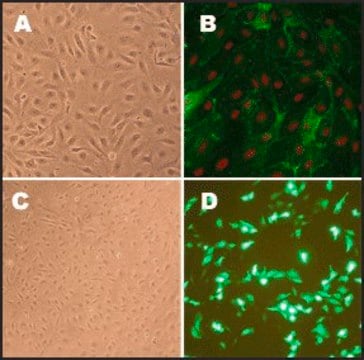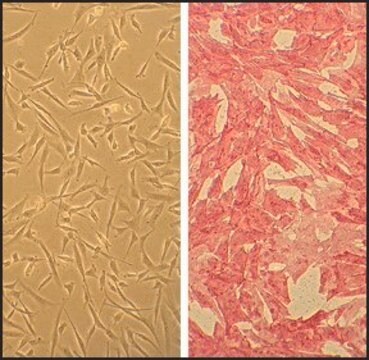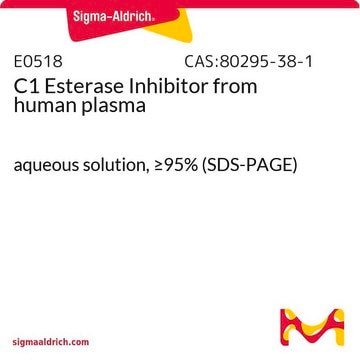352-05A
Human Pulmonary Artery Smooth Muscle Cells: HPASMC, adult
Sign Into View Organizational & Contract Pricing
All Photos(2)
About This Item
UNSPSC Code:
41106514
NACRES:
NA.81
Recommended Products
biological source
human intrathoratic artery (normal)
Quality Level
packaging
pkg of 500,000 cells
manufacturer/tradename
Cell Applications, Inc
growth mode
Adherent
karyotype
2n = 46
morphology
smooth muscle
technique(s)
cell culture | mammalian: suitable
relevant disease(s)
cardiovascular diseases
shipped in
dry ice
storage temp.
−196°C
General description
Lot specific orders are not able to be placed through the web. Contact your local sales rep for more details.
HPASMC has been used to show that IL-22 promotes the growth of pulmonary vascular SMCs via a signaling mechanism that involves NADPH oxidase-dependent oxidation (Bansal, 2013). Inducers of pulmonary hypertension, characterized by thickened pulmonary arterial walls, activate expression of anti-apoptotic Bcl-xL gene via binding of GATA-4 to its promoter; the activation can be suppressed by targeting gata4 gene transcription (Suzuki, 2007). Serotonin induces growth of Pulmonary Artery Smooth Muscle Cells and is able to transactivate the BMP receptor in pulmonary artery SMCs, leading to activation of Smads 1/5/8 via Rho and Rho kinase pathway (Liu, 2009). Pulmonary Artery Smooth Muscle Cells growth can be suppressed by trans-retinoic acid by inducing expression of GADD45A, a known cell growth suppressor, downstream of the retinoid acid receptors RARalpha, RARbeta, RARgamma, RXRalpha, and RXRbeta, indicating possible involvement of retinoic acid in pulmonary vascular remodeling (Preston, 2005). Treatment of Pulmonary Artery Smooth Muscle Cells with plasma containing reduced levels of all-trans RA and 13-cis RA promoted cell growth (Day, 2009). Retinoic acid was also shown to inhibit migration of pulmonary smooth muscle cells by inhibiting PI3K/Akt-dependent reorganization of actin cytoskeleton (Day, 2006). Pulmonary Artery Smooth Muscle Cells were also used to study effects of iron chelation on vascular remodeling and its implications for development of pulmonary hypertension as a result of ROS activity (Wong, 2012). Finally, these cells were used to show that antitumor drugs can selectively target remodeled pulmonary vessels, but not normal vessels (Ibragim, 2014).
Characterization: positive for smooth muscle cell specific alpha-actin expression.
HPASMC has been used to show that IL-22 promotes the growth of pulmonary vascular SMCs via a signaling mechanism that involves NADPH oxidase-dependent oxidation (Bansal, 2013). Inducers of pulmonary hypertension, characterized by thickened pulmonary arterial walls, activate expression of anti-apoptotic Bcl-xL gene via binding of GATA-4 to its promoter; the activation can be suppressed by targeting gata4 gene transcription (Suzuki, 2007). Serotonin induces growth of Pulmonary Artery Smooth Muscle Cells and is able to transactivate the BMP receptor in pulmonary artery SMCs, leading to activation of Smads 1/5/8 via Rho and Rho kinase pathway (Liu, 2009). Pulmonary Artery Smooth Muscle Cells growth can be suppressed by trans-retinoic acid by inducing expression of GADD45A, a known cell growth suppressor, downstream of the retinoid acid receptors RARalpha, RARbeta, RARgamma, RXRalpha, and RXRbeta, indicating possible involvement of retinoic acid in pulmonary vascular remodeling (Preston, 2005). Treatment of Pulmonary Artery Smooth Muscle Cells with plasma containing reduced levels of all-trans RA and 13-cis RA promoted cell growth (Day, 2009). Retinoic acid was also shown to inhibit migration of pulmonary smooth muscle cells by inhibiting PI3K/Akt-dependent reorganization of actin cytoskeleton (Day, 2006). Pulmonary Artery Smooth Muscle Cells were also used to study effects of iron chelation on vascular remodeling and its implications for development of pulmonary hypertension as a result of ROS activity (Wong, 2012). Finally, these cells were used to show that antitumor drugs can selectively target remodeled pulmonary vessels, but not normal vessels (Ibragim, 2014).
Characterization: positive for smooth muscle cell specific alpha-actin expression.
Cell Line Origin
Artery
Application
cell growth, signaling, receptor transactivation and suppression, vascular remodeling
Components
Basal Medium containing 10% FBS & 10% DMSO
Preparation Note
- 2nd passage, >500,000 cells in Basal Medium containing 10% FBS & 10% DMSO
- Can be cultured at least 16 doublings
Subculture Routine
Please refer to the HPASMC Culture Protocol.
Disclaimer
RESEARCH USE ONLY. This product is regulated in France when intended to be used for scientific purposes, including for import and export activities (Article L 1211-1 paragraph 2 of the Public Health Code). The purchaser (i.e. enduser) is required to obtain an import authorization from the France Ministry of Research referred in the Article L1245-5-1 II. of Public Health Code. By ordering this product, you are confirming that you have obtained the proper import authorization.
Storage Class Code
11 - Combustible Solids
WGK
WGK 3
Flash Point(F)
Not applicable
Flash Point(C)
Not applicable
Choose from one of the most recent versions:
Certificates of Analysis (COA)
Lot/Batch Number
Sorry, we don't have COAs for this product available online at this time.
If you need assistance, please contact Customer Support.
Already Own This Product?
Find documentation for the products that you have recently purchased in the Document Library.
Our team of scientists has experience in all areas of research including Life Science, Material Science, Chemical Synthesis, Chromatography, Analytical and many others.
Contact Technical Service






